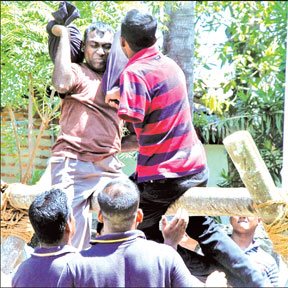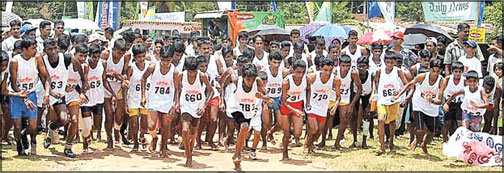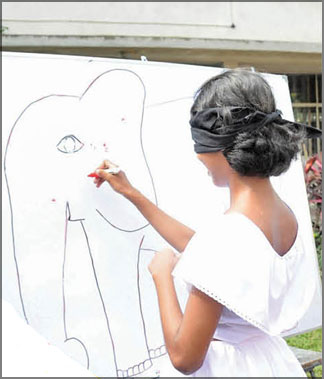The koha still shouts
Ishara JAYAWARDANE
Meanwhile speaking to the Daily News Emeritus Professor, University
of Colombo, Prof. Kusuma Karunaratne said that the Sinhala and Tamil New
Year or the Aluth Avurudda is a joyful occasion and it coincides with
the holiday season, especially for school children. It is celebrated in
many ways and sports and games constitute an important form of
rejoicing.

There is a variety of indoor and outdoor games associated with this
festive occasion. One main game practiced by the Sinhala villagers,
especially the young people, is Pancha Keliya. There are several names
used for this : Pancha Dameema, Kavadi Dameema and Bello Dameema. In
different areas of the country they used different terms. This is done
by using shells. This is a traditional game that has been there for a
long time. When I was a child I used to enjoy it tremendously.
The playing of the Rabana (drum beating) is an important activity
during the New Year. Rabana is of course used on other occasions too.
For example, when a newly married couple comes home, everybody is happy
and they play the Rabana. So it is meant for happy occasions. This is
mainly done by females and elderly females but we as small children
could also join with the elders. When we were children we all had the
opportunity of going on the swing. Women and children ride the onchilla
- the swings - strung on trees. When they play the rabana, it is
accompanied by singing raban pada (raban songs).
Likewise, singing is also a part of riding swings and these songs are
called varang kavi. Our folk literature is full of such raban pada and
varang kavi. Then there are items such as Beauty Queen contest ( Avurudu
Kumari and Pancha Kalyani) and Fancy dress competitions. There is an
impression that these items have been introduced in the very recent
past. This is not exactly correct. Even when I was a child I have seen
the Avurudu Kumari and Pancha Kalyani contests. The only difference is
that these events are more commercialised today. Cycle races were there
when I was a child but not in a large scale.

Cricket matches is an item of recent origin. Elle was a game
traditionally played in rural areas particularly after the harvesting
season which coincides with the New Year season. When farmers finish
harvesting, children have ample room to play in the fields.
There are New Year celebrations organised by various village
associations. Among the sports and games played at these functions are:
climbing the greasy pole, pillow-fighting, tug-o-war, kanamutti bindeema,
pora pol gaheema, placing the eye on the elephant, coconut scraping,
lime and spoon, bicycle races etc.
There are games especially for women and small children too. Some
games such as Ankeliya and Pora Pol Gaheema have religious overtones.
These games are also performed during the New Year season. Nowadays
various TV channels also organise New Year festivals. The telecasting of
such cultural events has a positive effect. The younger generation
particularly in urban areas who are not familiar with New Year rituals
and games can learn a lot about our culture. It has a commercial aspect
but it also serves a purpose. People celebrate the New Year irrespective
of their ethnic and religious differences, and therefore, these
celebrations can be used to promote ethnic harmony among various
communities. The rituals and games associated with the New Year play an
important social function.
They help to strengthen relationships among family members,
neighbours, and the village community. It is a special time which allows
people to relax for a while and be away from their tedious daily
routine. It is particularly important for the woman folk in the village
to experience something different from their routine life. Therefore,
Sri Lankans must try to preserve these games for posterity.
Sri Lanka is going through a phase of sweltering heat. It is the
hottest new year in recent times. And in this baking heat the smell of
kavum and kokis will soon pervade the air and one would be right in
thinking that the koha would certainly not mind the oppressive heat. The
cashier girls at KEELLS and CARGILLS will be dressed in their
appropriate New Year outfits industriously working at the counters. Like
busy bees, customers will be making last minute purchases to take to
their relatives in the villages. The media as always will paint the town
red with New Year programmes. And in all this we cannot forget the
festivities. But the real question is what has really become of New Year
Celebrations? Is there a difference between now and then? Is it still
done with fervor? How many additions have we seen? And how many seem to
be outdated or declined?
Just another holiday
Pavithra, a young lady of 25 said: “During the time I was schooling,
the denizens of my village got together to celebrate Avurudu. However I
did not take part in games like Ang Keliya, Olindha Keliya and Pancha
Dameema; however I have taken part in Mutti Bindeema and Banis Kama and
Avurudu Kumari competition. I enjoyed it a lot but when you compare
those celebrations in the past, it is a bit more complex.

So those days’ people come together for the New Year/ Avurudda. So
you meet friends and it is a happy occasion. But now the question is
where you can hold these events, because the land has been taken for
housing and there is no space. If someone organises the event at a field
we go for that but there are strangers and there is no togetherness but
still it is an anticipated event and we remember the good old times.
Those days there was time and space to do the games. People were full of
enthusiasm but now the occasion serves the purpose of just another
holiday. It has become very complex with the new lifestyles.
Chaminda, 29 years of age said that when he was little the Aluth
Avurudda was something that was much anticipated. Everyone looked
forward to the month of April. This was an opportunity to have
fellowship with friends and neighbours so they were very much interested
in organising New Year festivities.
“That was something we did with pleasure. We did this in a small way
getting money from our parents and we organised festivities which gave
people a lot of satisfaction and joy. We did this on a small scale in
our tiny way. This gave us a lot of pleasure and that sense of
togetherness. The difference between New Year games and other
competitions is that the purpose of New Year games transcends winning or
losing but to foster good feeling and friendships. Even the Raban
competition is how you play the game and not whether you win or lose.
Onchili Padeema involves singing of folk songs and our identity as Sri
Lankans can be shown to the world. It is a fun time for all of us. We
are very fond of our mothers making Kavum.
However in modern times things have been added to this tradition,
like cycling and other games. In place of the Banis Gediya you have to
eat the apples in a tub of water. Now there are Fancy dress competitions
(Vikata Adhum Tharangaya) and there are new refinements in this
competition that was not seen before. So these traditional games have
changed and taken on a modern aspect. So I feel that the traditional
forms have declined. I think that because of the busy and hectic life
styles of the youth, they no longer have the time and space to enjoy
these festivities. This is even true when you think of older people with
all their responsibilities.”
Avoiding New Year celebrations
Pradeep (28), felt that there is a greater diversity in New Year
celebrations with a wide representation from not only the youth but the
elders as well. “We see participation from housewives. It covers many
aspects such as knowledge and entertainment and the spirit of the game.
All of this is encompassed in New Year celebrations. Despite differences
and problems with each other everyone takes part in these celebrations
and there is unity and reconciliation. After the competition, after the
games we see a sort of camaraderie. Actually as children we really
enjoyed immense freedom.

That is the uniqueness with New Year celebrations. Even though we
were small there was that freedom. There was also that learning element
coupled with enjoyment. But now it is different because life has changed
and it has become more hectic. Even the concepts have changed. How we
look at things have changed. Many questions arise in our minds: can we
derive excitement from this? Will we be accepted lovingly? Who will
organise the New Year’s events? This is done by a limited number of
people, No one strives for togetherness. People have also lost interest
in participating in these events.”
When you compare then and now something I see is that there are two
sides to this. Good and Bad.
The media with its technology and with the internet, seem to be
promoting and carrying these events forward if we look at this through
the eyes of the media.
The downside is that some of these items have taken a different form.
Are the replacements for these events part of our culture?
Banis Kama seems to have been replaced by eating apples so in the
future what kind of replacements will we see? Are these replacements
rooted in our culture? So whose New Year are we celebrating here? So we
have to take so many things into consideration - the time factor, the
financial situation and commitments.
There is clearly a difference between now and then. So you can look
at it positively or negatively. When it comes to Tamil celebrations and
Sinhalese celebrations there are differences but also similarities. So
again what we have to consider here is the perception and attitude of
the children in modern times. It seems that they cannot enjoy simple
things. These have now become jokes in the eyes of the children. In Sri
Lanka youngsters grow up in a world of Harry Potter.
They question how they can receive pleasure from the New Year games?
How can a person who has played Delta Force relate to these New Year
games? They live in a totally different world constructed around them.
They have been convinced that New Year games cannot interest them.
Parents are now alleging that children live in money minded world and
have scant respect for their parents. We are partly to be blamed for
this. We promote this rat race, so is it any surprise that children are
turning out like this? There is no point in blaming the children in this
globalised world. I know that my younger relatives avoid New Year
celebrations and do not go there even by accident!
Decline in participation
Peshan (27) recollections of New Year Celebrations were Kana Mutti
Bindeema and Aliyata Aha Thabeema and Banis Kama. “I did a lot of
country sports like Lissana Gase Nageema. When I was in Galle I engaged
in those kinds of sports but it was during my school days mostly. I
liked doing these games because I did them with my friends.
More than competition it was the eating part that I liked the most!
Aliyata Aha Thabeema was something no one really was able to do
successfully. So all this was very humorous. Once I attempted Kana Mutti
Bideema and I was very naughty I dashed all the small muttis. But now I
feel it is more commercialised. In rural areas it was there to create
unity amongst the village. After corporations started sponsoring it,
though there is the element of happiness there is no togetherness. It is
more commercialised.”
Lavanga, another young lady of 24 years said “From the time I was
small I liked it, and wanted to even win a prize. So I have taken part
in such festivities. I have taken part in organising festivities by
collecting money. I had a lot of fun taking part in such things. In the
bicycle race I took part in throwing water. After the Tsunami the
celebrations stopped. The fields have been used for housing and you
cannot even find a place to celebrate. So yes I agree with the fact that
new things have been added to the list. However I feel that there is a
decline in participation.”
Harshani, who is 22 years spoke last said “I lived in Narahenpita. It
is an urban area so to a great extent we have festivities done on the
road since there is no available space. We do Kamba Adeema on the road.
Everything is virtually done on the road. It is organised by a welfare
society. However I like the festivities done on the village level to the
ones done in the urban areas.” |





